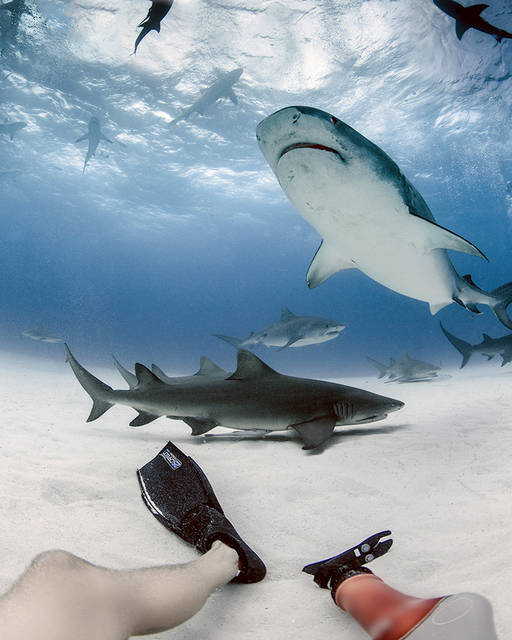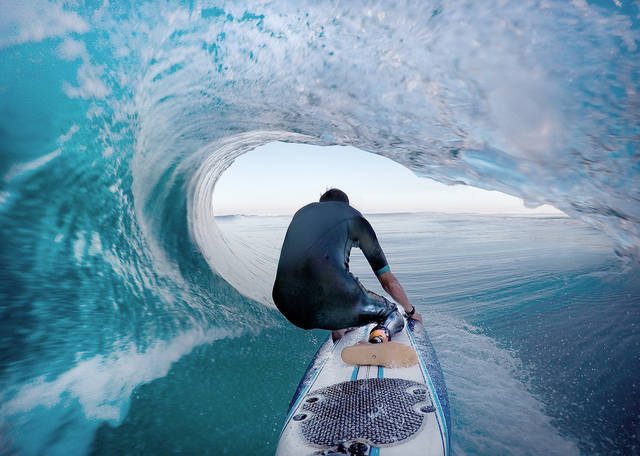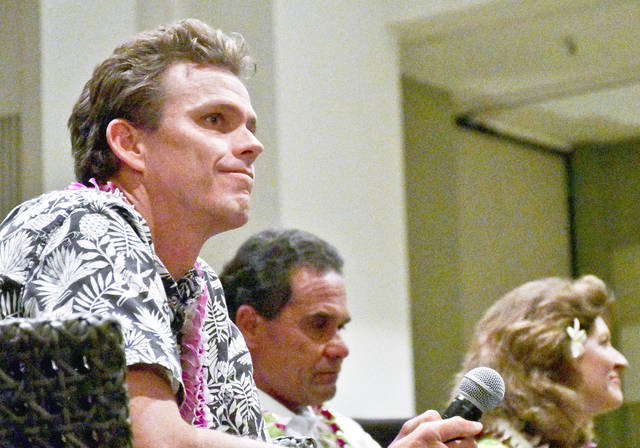Mike Coots: Standing strong for sharks

Photo courtesy Mike Coots
Mike Coots surrounded by sharks on one of his underwater photography trips.

Photo courtesy Mike Coots
Mike Coots riding a barrel.

Dennis Fujimoto/The Garden Island
Mike Coots
Mike Coots still remembers that day, 21 years ago, when he lost his right leg to a tiger shark.
Mike Coots still remembers that day, 21 years ago, when he lost his right leg to a tiger shark.
He remembers it clearly.
He was 18 years old, ready to head out with his board and catch some waves on the Westside at Majors Bay, when it happened. Without warning. Suddenly, a shark was just there.
And just as suddenly, his leg was gone.
Mike Coots overcame where others may have faltered, given in to fear, never returned to the ocean and set out for revenge on sharks. As soon as he could, he returned to the water.
“I was just happy to be alive. I felt I was on borrowed time,” he said.
Initially, he questioned why he got attacked. What were the conditions that day? What might have led to it?
“The more I searched, the more questions I had,” he said.
Then, he got a call from someone, a shark conservationist (the first time Coots had heard that term), who told him about the documentary, “Sharkwater.”
He watched it. It changed him.
“I knew what sharks were doing to humans,” he said. “I didn’t know what humans were doing to sharks.”
Coots would return to surfing. Return to bodyboarding. And with a special prosthetic, he would even return to running. He lives what he calls a fortunate and blessed life in one of the world’s most beautiful places.
He would become a professional photographer and, perhaps surprisingly, a shark conservationist, a protector of sharks, someone who tells people of the importance of sharks and that they really are majestic creatures critical to the ocean’s health. He has become a voice for them. He has stunning pictures of himself right there in the mix, with sharks swirling all around, in his journeys that have taken him throughout the world.
But his fight for sharks is an uphill one.
In his research, Coots found that, tragically, more than 100 million sharks are killed for their fins each year. It is a billion-dollar industry that is about money, not marine life.
That’s another reason he calls for laws to protect them.
“I think sharks are greatly misunderstand, and a lot of that is that’s the way Hollywood views it,” he said. “In films, they have black eyes, no soul, lifeless, man-eating creatures.
“When you dive with sharks, you realize they’re a lot different. You can almost see a soul.”
It’s that soul he captures in his underwater photos — “pictures almost like there’s a human trait to it. You can humanize it.
“I think if people can see a little bit of themselves in sharks, they’re much more likely to learn about sharks, protect sharks and get actively involved in what they can do to help sharks.”
Sharks are apex predators. Coots compares them to the roof of a house.
“They basically keep everything below them in check,” he said. “They are a very important species in our ocean.”
Healthy shark populations lead to healthy fish population and vibrant coral reefs, Coots said.
“Everything goes hand in hand in the ocean, and sharks are a very important part of that,” he said.
Thursday night, Coots joined a panel discussion on being an ocean-minded community and the importance of water safety. In a short talk later, he also recounted some of his experiences.
In an earlier interview with The Garden Island, Coots talked about what happened that day a tiger shark attacked.
•••
It was early morning. I was with my bodyboarding team and coach. It was kind of like any other day. We had a really bad summer of no waves. And this was pretty much, even though it was late October, it was like our first good swell. It was the first day of the good swell we heard about that morning.
I remembered a really foul, stinky smell when our car doors opened. It was back when you could drive on the sand right up to the surf spot and it was like a smell I never smelled before. You walk into maybe a fishmonger’s ice box that the power went out for a week. It was nasty. Because the waves were so good, nothing was stopping us.
We paddled out and I think it was maybe 7, 7:15 in the morning. It was at Majors Bay and it’s where the sand sort of hits the reef, we’re right kind of on the edge of that, in about 30 feet of water, 100 yards off shore. My friends all got really good rides right off the bat. There was a stranger next to me that I hadn’t seen before and this beautiful wave came, because all my friends were inside I kind of didn’t want to show off, but you want to get the last wave of the set. I looked at him and he looked at me, like, ‘Who’s going to go?’ and I remember sort of making that initial paddling motion, my fingers brushing the water, sort of saying ‘My wave.’ As soon as you make that motion. Anyway, I did that and a large tiger shark came up from underneath me. I didn’t see it. There were no fins from afar, no any sort of sign anything was going to happen. It was a complete blindside attack.
It came up and grabbed on to me. I felt immense pressure. I didn’t feel any pain, zero pain. It was like everybody was sitting on top of my leg and it started swinging me back and forth.
I stuck my right hand in its mouth to try and get my legs out and it was in my chest. I could see it was a shark, a big shark. I could feel it pressing against my chest. I don’t remember any noise or anything, just this crazy pressure and it started swaying back and forth and as it finished swaying, it started to get a bigger bite out of my leg, opening its mouth more.
Totally out of instinct, my left hand, I socked it a few times in the nose. Right away, it let go. I felt that pressure release and it just disappeared.
I looked at the surfer next to me. He was as white as a ghost. His eyes were like literally out of his head. I yelled, ‘Shark, go in,’ and he took off for the beach and I started paddling behind him. I think it was my second or third paddle stroke, I looked and I could see blood and my finger was split open. I’ve got a full scar right here. I could see the bone, it was like a potato pulled open. It was like, I’m hurt, I had no idea about my leg. I was just worried about my finger.
He starts paddling in faster, didn’t say a word, and my right leg starts spasming. I thought the shark was about to finish me off because when you’re paddling, you’re prone, you don’t look behind you. I felt like this crazy shake, uncontrollable shake and I looked over my shoulder thinking it was a shark and it wasn’t. It was my leg, completed severed off, like you just took a samurai sword to it. There were big squirts of blood and my heart was like, ‘Oh boy, this isn’t good.’ I didn’t feel it come off. I had no idea, no idea.
A little tiny wave came, I was bodyboarding so I didn’t need to stand up or anything like that. I rode it right up to the sand. My friends saw what was happening and they caught the wave right behind it. They all kind of came to me and I reached the sand and I tried standing up just because that’s what you’re used to with a whole leg, you stand up. But no foot, no leg. I remember kind of falling down because the wave sort of took me up this little dune embankment. I stood up and fell and kind of rolled down. I remember being covered in blood, this blood, sand mix. My friends grabbed me and took me a little further up. I had a bodyboard leash that my friend made a tourniquet with to stop the bleeding. He started saying a prayer for me and I remember closing my eyes and not really being scared. I thought I was going to die, but not a scared feeling. No life flashing before your eyes. Just a real calm, collected, warm, comfortable feeling. There was no scariness or anything, and he said a prayer for me and I opened my eyes and my friends were all circled around me.
This guy had seen it from the parking lot on Majors Bay and he took his truck in four-wheel drive and he pulled right up to us. Literally, my eyes opened and there was a pickup truck right there. And they threw me in the back of the pickup truck and he had a couple surfboards and they had this cloth board bag on it and nobody was thinking enough to go in the back of the truck with me, it was just such a fast, ‘get him to the hospital.’ He took off, the tailgate’s down, and I’m by myself in the back of this truck.
We pulled onto the highway and I started going into shock. Really hot, really cold, really hot, really cold. I didn’t want to look at my injury because I thought it would freak me out, so I started playing with that cloth board bag and playing with the fabric to keep my eyes off things.
Every once in a while we could pass a car and I would look at the expression of the people that we passed because the tailgate was down. The blood was just gushing out. There were like mothers and kids going to school and we were heading to KVMH and I could see a little kid and a mom, the look on their faces, I knew it wasn’t good.
You know how you can tell your injuries by the reaction of others? I was like, ‘Oh, boy.’
We pulled right into KVMH, and I remember a nurse and the doctor and I remember the doors opening up. He runs out and puts his arm on my shoulder, just touches my shoulder, and my body just goes, I pass out. I woke up, it must have been a half hour later at KVMH and was sort of in this lucid daze and they were like, ‘You got attacked by a shark.’ I’m like, ‘I know.’
‘What kid of shark was it?’
‘It was a tiger shark.’
I’m kind of in this weird fog and I passed out again. And I woke up and I was in the ambulance getting transferred to Wilcox and my dad is a paramedic and his partner, they knew me and were making shark jokes. I passed out again and woke up, it was a whole day later at KVMH. My family was around me, it was a real somber moment. Everybody was kind of real sad. I was opening my eyes, it goes from darkness, like in the movies, and then it gets bright. Everybody was around my bedside, tears and crying and the doctor looks at my mom and my mom looks at the doctor. “Should we tell him? No you tell him.’ It was back and forth and I’m like, ‘Are they going to tell me I’m going to die in about five minutes?’
‘You lost your leg. Your leg is gone. You don’t have a leg.’
‘I know. I saw it come off.’
Everybody started laughing. ‘He’s alive. He’s happy.’ And it was real uplifting. From there, it was just good vibes, a lot of friends and family and community support. It was ideal for me. I was very fortunate.
I’ve been fortunate not to have any bad dreams. No flashbacks.
Any animosity toward sharks?
The shark attack is what it was. There’s no animosity. It’s one of those things that happened. It goes with the ocean.
How did the surgery go?
I was in the hospital about a week or so and I was bedridden for about a month. And I remember going to Oahu and seeing Dr. Singer. He reattached the nerves in my index finger because that had been severed. About a month later the doctor on Kauai said, ‘We’re going to take your stitches and staples out tomorrow, the risk of infection will be gone. After your appointment tomorrow, you can go back into the water.’ We were all so very excited.
What happened next?
That day, he takes it out, I literally go when the waves are good, right by where the shark attack happened, it just so happened I went back in the water very close to where the attack happened, same stretch of sand, not the very same surf spot, but very close.
What about the day you returned to the ocean?
I remember just taking the crutches, it was the soft, hot sand, the crutches just sinking halfway down, it was an awkward hop in the hot sun and I finally get to the water’s edge. I knee into it and it was just the most amazing feeling, feeling that salt come over my body. It was one of the greatest feelings ever. I felt like I was heading back home or something, in a weird way. It felt really good.

